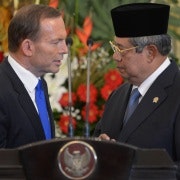Shorten must show he can do the job
Bill Shorten’s becoming opposition leader gives Tony Abbott greater reason for concern than an Anthony Albanese victory would have done.
The ALP has opted for the man seen as more likely to take Labor into a new era, with the better chance of reaching out to the aspirational voters that the ALP will need to re-attract.
Shorten might not have Albanese’s aggression in Parliament, but that is not what’s most important for Labor’s leader just now. The main imperative is looking forward, to identify where the party should be when the next election comes. Holding the government to account is a necessary part of the opposition’s role but it is not sufficient.
Certainly voters are sick of the high octane mutual attacks of the last few years. Abbott won with negativity primarily because it resonated with voters' opinions of the Labor government, not because they liked it per se. Anyway, to the extent it’s needed, Albanese is there to help with the negative side of the heavy lifting.
Shorten will also have other strong players around him: Tanya Plibersek, his choice for deputy (good to have a woman when the government has so few, and Plibersek’s media savvy); the competent and experienced Chris Bowen will be shadow treasurer. The new leader’s first test will be how he allocates portfolios among the frontbench the caucus elects. It will be bad news if factional hacks do well.
Shorten, who entered parliament on the 2007 Rudd wave, has shown policy and political skills. As parliamentary secretary for disabilities (a position he was initially dismayed at being given) he started the ball rolling towards disability insurance, one of the most important legacies of the Labor government. He made a fair fist of workplace relations; in the government’s last days he negotiated well on the Gonski package.
But opposition leadership is an entirely different game, especially for someone who has spent his whole parliamentary career in government. Suddenly, there is no department to call upon, resources are short, relevance is more limited. The job is not called the hardest one in politics for nothing. It takes stamina, patience and (as Abbott showed so well) discipline. Shorten will have to make sure his short fuse is always under control (think previous altercations in a pie shop and taxi).
Shorten was the preferred choice of the caucus by almost two thirds to one, but only won just over 40 per cent of the rank and file vote. It would have been potentially more difficult if the winner had lacked caucus support; and the rank and file are more left, so their opting for Albanese wasn’t surprising. But Shorten acknowledged that he has work to do with the party at large.
Critics will point to Shorten’s role in first knifing Kevin Rudd and then switching back to Rudd, deserting the woman he helped install. Some in the party regard him with great distrust. Will voters care? Not so much if he does a good job, and can tap into what is concerning ordinary people.
He will carry some scars for his behaviour but the difference with the scars that did so much damage to Gillard is that he has always been seen as the schemer while she enjoyed a more benign image, and so people were shocked when she struck. His background as a former union heavy also has its drawbacks. But offsetting that is the fact he has good links into the business community.
Some would argue it would be better for Shorten not to be in the job at the moment because the leader now is unlikely to be the next Labor PM – that Abbott will get two terms at least and Labor will change leaders.
But Shorten had no choice but to run. When he has worn his ambition on his sleeve probably from kindergarten days, it would have looked odd or opportunistic not to have fronted. In politics you take the opportunities when they come.
Also, anything can happen. Who would have thought Abbott, who got the leadership by one vote, would have lasted four years as opposition leader and done so well at his first election?
Unless there is a change in ALP rules Shorten’s leadership is safe for this term. Under the 'Rudd rules' it takes 60 per cent of caucus to initiate a spill against an opposition leader. Assuming the Coalition does win next time, Shorten would face another ballot (if he was opposed). By then, there could be other ambitious people with eyes on the prize such as Chris Bowen and Jason Clare in his own right faction. Shorten would need to have done well enough electorally to earn a second go.
Michelle Grattan is a professorial fellow at University of Canberra.
Michelle Grattan does not work for, consult to, own shares in or receive funding from any company or organisation that would benefit from this article, and has no relevant affiliations.
This article was originally published at The Conversation. Read the original article.
















